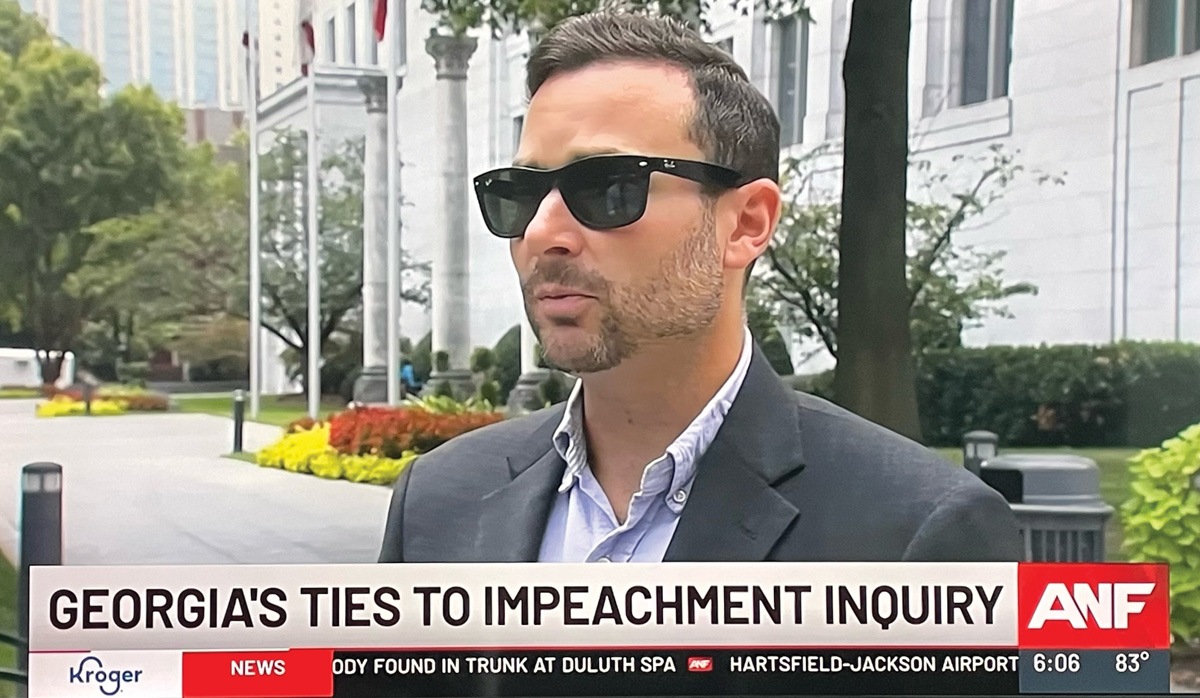
Courtesy of Anthony Michael Kreis
With classes at Georgia State University’s College of Law finished for the semester, Professor Anthony Michael Kreis has officially decamped for his summer office: a sunny patio table at Press and Grind cafe in Virginia-Highland. “There are a few of us that linger here for hours,” says Kreis, sipping a coffee (large, hot, dash of skim milk) and sporting navy athletic shorts. “The baristas don’t seem to mind us.”
Summertime may allow for leisurewear, but it’s no holiday for Kreis, an expert in civil liberties and constitutional law who often lends his insights to news outlets around the country (he happens to be extremely telegenic—no small feat among legal scholars). Lately, he’s become a go-to source on questions about President Donald Trump’s frenzied efforts to reshape the federal government—the main question usually being, Can he do that?
When it comes to Trump’s executive order overturning the constitutional right of birthright citizenship, Kreis’s reply is unequivocal: No, he cannot. “The seemingly simple proposition, ‘No citizenship for children of unlawful immigrants’ . . . is inconsistent with the rule of law,” he and coauthors Evan Bernick and Paul Gowder wrote in a legal article in March. That article—a response to a New York Times op-ed, written by legal scholars Randy Barnett and Ilan Wurman, that supported Trump’s interpretation of birthright citizenship—turned Kreis and his coauthors into lightning rods for the storm of online debate raging around one question: Are children born to undocumented immigrants constitutionally
recognized citizens of the United States?
Calling it a “debate” is a stretch, Kreis says. Birthright citizenship has been considered settled law since it was established in 1868. Created after the Civil War to clarify the rights of newly emancipated Black Americans, the 14th Amendment states, “All persons born or naturalized in the United States, and subject to the jurisdiction thereof, are citizens of the United States and of the State wherein they reside.”
“The history is unambiguous about what they were trying to do,” says Kreis, “which was to make clear that nativity is what makes a citizen a citizen.”
But recently, a small cadre of legal scholars has begun promoting a once-fringe legal theory that “jurisdiction” applies to neither undocumented immigrants nor their children. Kreis and his coauthors are deeply skeptical of this idea, writing, “Advancing a sloppy position that children could be punished with statelessness, for whatever the sins of their parents, is contrary to our constitutional tradition.”
The paper’s tone, Kreis says, was strident on purpose. He was alarmed to see such an “off-the-wall idea” published in the country’s newspaper of record, lending it undue credibility. “I just have such a pet peeve about bad history,” he says. “I can’t let that slide.”
Kreis and his coauthors have continued the conversation online, sparring with Barnett, Wurman, and other birthright-citizenship skeptics and answering questions from the public. The intra-legal scholar debate has been mostly civil, but not always: In April, Barnett replied with a laughing meme to a post on X calling Kreis a “foppish dandy.” That did not sit well with Kreis. “I don’t mind taking arrows,” he says. “But a law professor laughing at homophobic jokes because I said, ‘You’re wrong’—that’s just unbecoming for anybody.”
Nevertheless, Kreis has persisted. Trump’s executive order will be hashed out in the courts, but he doesn’t see the anti-birthright citizenship movement succeeding in the long run: “We constitutionalized this question so that there would be no debate.”
This article appears in our July 2025 issue.
Advertisement




